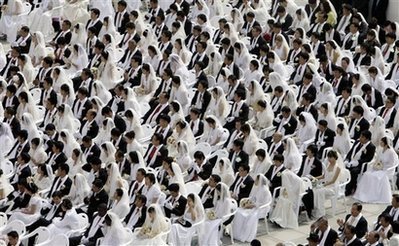Kishida Announces Long-Awaited Investigation into Unification Church
Unification Church mass wedding in South Korea (Flickr).
According to a Kyodo News survey in early October, Japanese Prime Minister Fumio Kishida’s Cabinet ratings have plummeted to 35%, their lowest since he took office one year ago. Kishida’s unpopularity stems, in-part, from his failure to address claims against the financially exploitative Unification Church, known for its “spiritual sales” and mass weddings. On October 17, under pressure from the Consumer Affairs Agency, Kishida announced that his government would launch an investigation into the Unification Church and its suspicious financial management.
While claims against the Unification Church in Japan are not new, they have received increased national attention since the assasination of former Prime Minister Shinzo Abe in July. Tetsuya Yamagami, the man who shot Abe, cited Abe’s ties to the Unification Church as a reason for murdering him. Yamagami claimed that his mother had suffered financial ruin after making huge donations to the church. The extent of Abe’s connection to the church is unknown, though in 2021 he appeared in a promotional video for an organization affiliated with the Unification Church.
Since Abe’s death, internal investigations into the Liberal Democratic Party (LDP) have revealed ties between nearly half of its members and the Unification Church. Legal expert Hiroshi Yamaguchi, head of the National Network of Lawyers Against Spiritual Sales, claims that the church has “built ties with politicians in Japan to attract followers and gain legitimacy.” In return, politicians have been able to rely on church members for campaign support.
However, the doctrine and financial practices of the Unification Church have long faced scrutiny. Originating in South Korea, the religious order was founded in 1954 by Sun Myung Moon, an anti-communist and self-proclaimed prophet. In the late 1960s, when the Unification Church began to take root in Japan, Moon pursued aggressive fundraising efforts, convincing Japanese followers that donating money would atone for the sins of their ancestors who had colonized the Korean Peninsula. In the 1980s, the church faced accusations of devious recruitment tactics and the brainwashing of followers. Today, the Unification Church continues to pressure followers into “spiritual sales”–paying exorbitant prices for jars and other items–by threatening them with “ancestral karma.”
As of July, the National Network of Lawyers Against Spiritual Sales had assisted over 300 individuals who have suffered financial damage because of the Unification Church. They reported receiving over 34,000 complaints involving money lost to the church, totalling over 120 billion yen ($900 million). Tetsuya Yamagami, murderer of Abe, claims that the Unification Church persuaded his mother to donate around 100 million yen ($736,000), which led to her financial ruin. The church claims to have returned $400,000 to Yamagami’s mother and denies coercion.
Preparations for the long awaited investigation of the Unification Church will begin as early as October 25 according to Keiko Nagaoka, the Japanese minister of education. The education ministry will convene a board of experts on religion, legal matters, and religious corporations to discuss the appropriate approach to an investigation. After receiving approval from the Religious Corporations Council, the investigation will commence under the Religious Corporations Act.This act was enacted in 1996 after the Aum Shinrikyo sarin gas attack on a Tokyo subway. The act grants the government the “right to question” religious corporations like the Unification Church, which are tax exempt. If the education ministry decides to pursue dissolution, the church can continue to operate as a religious group but will no longer enjoy tax benefits, making operations more difficult.
In his remarks to the Lower House of the Diet, Kishida stated, “I want to resolve issues related to the church.” He also outlined the goals of the investigation, saying “The government will clarify the situation, offer relief measures to the victims and take steps to prevent a similar situation happening again.”

